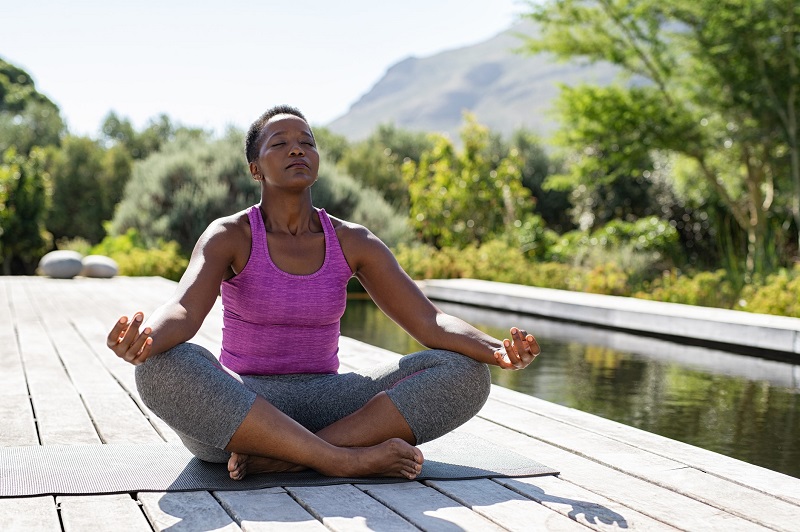BEAUTY
Self-Care Practices: What Are 10 Ways To Take Care Of Yourself?
Published
3 months agoon

In today’s fast-paced world, neglecting our mental and physical health is easy. However, it is important to find ways to take care of yourself. Doing this will lead to a fulfilling and productive life.
Next, by just using a few simple ways as a guide in your daily routines, you can greatly take care of yourself and your overall well-being. Let’s explore some effective ways to take of yourself to help you achieve better mental and physical health.
1. Get regular exercise.
Just 30 minutes of walking every day can boost your mood and improve your health. A daily 30-minute walk is an accessible and effective way to incorporate physical activity into your routine. This simple habit can have profound effects on your body and mind.

Walking helps to improve cardiovascular health, strengthen bones and muscles, and maintain a healthy weight. Moreover, it releases endorphins, the body’s natural mood elevators, which can help reduce stress, anxiety, and depression.
The act of walking outdoors also provides an opportunity to connect with nature, which has been shown to have additional mental health benefits.
If you’re short on time, consider breaking your walk into smaller segments throughout the day, such as a 10-minute walk in the morning, afternoon, and evening.
2. Eat healthy, regular meals and stay hydrated.
Proper nutrition and hydration are necessities in our physical and mental health. Eating balanced meals at regular intervals helps stabilize blood sugar levels, providing consistent energy throughout the day and preventing mood swings.

Focus on incorporating a variety of fruits, vegetables, whole grains, lean proteins, and healthy fats into your diet. These nutrient-dense foods supply the vitamins, minerals, and antioxidants necessary for optimal body function and disease prevention.
Equally important is staying hydrated. Water is essential for numerous bodily functions, including regulating body temperature, aiding digestion, and transporting nutrients. Aim to drink at least 8 glasses of water daily, and more if you’re physically active or in hot weather.
3. Make sleep a priority.
Quality sleep is crucial for both physical and mental restoration. During sleep, our bodies repair tissues, consolidate memories and regulate hormones.

Chronic sleep deprivation can lead to a host of health issues, including weakened immunity, increased risk of cardiovascular disease, and impaired cognitive function.
To improve your sleep quality, establish a consistent sleep schedule, even on weekends. Create a relaxing bedtime routine, such as reading a book or practising gentle stretches. Ensure your sleeping environment is dark, quiet, and cool.
Limit exposure to blue light from electronic devices before bedtime, as it can interfere with your body’s natural sleep-wake cycle.
4. Try a relaxing activity.
Incorporating relaxation techniques into your daily routine can significantly reduce stress and improve mental well-being. Experiment with different methods to find what works best for you.

Meditation and mindfulness practices can help calm the mind and reduce anxiety. Deep breathing exercises are simple yet effective in promoting relaxation and can be done anywhere, anytime. Yoga combines physical postures with breath control and meditation, offering both mental and physical benefits.
Other relaxing activities might include reading, listening to music, gardening, or engaging in a creative hobby. The key is to find activities that help you unwind and provide a sense of calm and contentment.
5. Set goals and priorities.
Setting clear goals and priorities can provide direction and purpose in life, contributing to improved mental health and overall satisfaction. Start by identifying your long-term objectives, then break them down into smaller, manageable tasks.
This approach makes large goals less overwhelming and allows you to celebrate small victories along the way. Prioritize your tasks based on importance and urgency, focusing on what truly matters to you.
Remember to be flexible and adjust your goals as circumstances change. Regular review and reflection on your progress can help maintain motivation and provide a sense of accomplishment.
6. Practice gratitude.
Building a sense of gratitude can significantly enhance your mental well-being and overall life satisfaction. Take time each day to reflect on the things you’re thankful for, no matter how small.

This practice shifts your focus from what’s lacking in your life to the abundance that already exists. Consider keeping a gratitude journal, where you write down three things you’re grateful for each day.
This habit can help train your mind to notice and appreciate the positive aspects of your life more readily. Expressing gratitude to others not only strengthens relationships but also boosts your own happiness and self-esteem.
7. Focus on positivity.
Maintaining a positive outlook can have profound effects on your mental health and even your physical well-being. While it’s important to acknowledge and process negative emotions, consciously choosing to focus on the positive can help build resilience and improve your overall quality of life.
Practice positive self-talk and challenge negative thought patterns. Surround yourself with positive influences, including uplifting people, books, and media.
Celebrate your achievements, no matter how small, and learn to view challenges as opportunities for growth rather than insurmountable obstacles.
8. Stay connected.
Human beings are inherently social creatures, and maintaining strong social connections is vital for our mental health. Regular interaction with friends, family, and community members can provide emotional support, reduce feelings of loneliness and isolation, and even boost cognitive function.
Make an effort to nurture your relationships through regular communication, whether it’s in-person visits, phone calls, or video chats. Join clubs or groups centred around your interests to meet like-minded individuals. Volunteering is another excellent way to stay connected while making a positive impact on your community.
By incorporating these simple yet effective ways to take care of yourself, you can significantly improve your mental and physical well-being.
Note that change takes time, so be patient and kind to yourself as you work towards a healthier, happier you. Every small step counts and consistency is key to seeing long-term benefits.
Seeking ways to take care of yourself is not selfish; it’s necessary for living a fulfilling life and being able to support those around you.
For more tips on ways to take care of yourself, your beauty, and your health, check here.

Ancient African beauty practices were rooted in nature and culture, blending self-care with physical well-being. These timeless rituals passed through generations continue to inspire modern beauty techniques.
Here are five remarkable practices:
1. Shea Butter for Skin and Hair Care
Shea butter, extracted from the nuts of the shea tree, is a staple in West Africa, especially in Nigeria and Ghana. Rich in vitamins A and E, it deeply moisturises the skin, promotes healing, and protects against harsh weather.
Traditionally, it was also used on hair to enhance growth and provide nourishment. Its soothing properties made it a remedy for burns and skin conditions, showcasing its therapeutic significance.
2. African Black Soap: Nature’s Cleanser
African black soap, made from plantain skins, cocoa pods, and palm tree leaves, has been a cornerstone of skincare for centuries.
Originating in Nigeria and spreading across West Africa, this soap is celebrated for its ability to cleanse deeply, exfoliate, and treat skin issues like acne and eczema.
Its natural ingredients make it a gentle yet effective solution, emphasising the continent’s resourcefulness in creating sustainable beauty products.
3. Mud and Clay Masks for Detoxification
Mud and clay have been integral to African beauty routines, especially in North and East Africa. These natural elements were used for their detoxifying properties, helping to draw out impurities while rejuvenating the skin.
The minerals in these masks improved skin tone and offered a calming and meditative experience. In regions like Morocco, Ghassoul clay became famous for hair and skin treatments, adding shine and vitality.
4. Beads and Piercings as Adornments
Beads and piercings were more than decorative; they symbolised identity, status, and spirituality. Waist beads, ankle bracelets, and body piercings were used to signify tribal affiliations, beauty, and even fertility.
This practice, prominent across Africa, highlights the continent’s artistry and the cultural significance of body adornments.
5. Dry Brushing and Natural Oils
Dry brushing, practiced in ancient Egypt, was a technique for exfoliating the skin, improving circulation, and promoting a glowing complexion.
Similarly, oils like Kalahari melon seed oil in Southern Africa provided hydration and protection against harsh climates. These practices were holistic, blending skincare with overall wellness.
These ancient African beauty practices demonstrate the rich heritage of natural and sustainable self-care. By embracing earth-based ingredients and methods, Africans nurtured beauty that was as functional as it was symbolic.
These traditions continue to resonate today, inspiring global beauty trends and connecting modern practices to their ancestral roots.
Would you like to read more on beauty? Visit here.

Jewellery, a timeless accessory, can elevate your style and express your individuality. However, with countless options available, how to choose jewelry for your personal style can be overwhelming.
To choose jewelry for your personal style, start with understanding your personal style. Are you classic, bohemian, minimalist, or edgy? Once you know your style, you can start selecting pieces that reflect your personality.
How to choose jewelry for your personal style also involves considering your skin tone. Cool tones look best in silver and white gold, while warm tones complement gold and rose gold.
The type of metal you choose is another important factor. Gold is a classic and versatile option, while silver is modern and edgy. Rose gold is romantic and feminine, and platinum is luxurious and durable.
How to choose jewelry for your personal style requires considering the occasion, your face shape, and your outfit. Whether you’re looking for everyday pieces or statement jewelry, there’s a perfect piece out there for you.
By following these tips, you can confidently select jewelry that enhances your natural beauty and reflects your unique style.
Understanding Your Personal Style
Before diving into the world of jewelry, it’s essential to understand your personal style.
- Classic: If you prefer timeless elegance, opt for classic pieces like pearl necklaces, delicate gold chains, and simple stud earrings.
- Bohemian: Embrace your free-spirited side with layered necklaces, chunky bracelets, and earthy tones.
- Minimalist: Keep it simple with sleek, minimalist pieces like dainty rings and delicate pendants.
- Edgy: Experiment with bold, statement pieces like oversized earrings, chunky rings, and edgy necklaces.
Considering Your Skin Tone
Your skin tone plays a significant role in choosing jewelry that complements your complexion.
- Cool Tones: If you have cool undertones, silver, white gold, and platinum jewelry will enhance your natural beauty.
- Warm Tones: If you have warm undertones, gold and rose gold jewelry will complement your skin tone.
Selecting the Right Metals
The type of metal you choose can significantly impact your overall look.
- Gold: Gold is a classic and versatile metal that complements a wide range of styles.
- Silver: Silver is a modern and edgy metal that pairs well with contemporary outfits.
- Rose Gold: Rose gold is a romantic and feminine metal that adds a touch of warmth to your look.
- Platinum: Platinum is a durable and luxurious metal that is perfect for special occasions.
Choosing the Right Earrings
Earrings can instantly elevate your look. Consider the following factors when selecting earrings:
- Face Shape: Choose earrings that complement your face shape. For example, long earrings can elongate a round face, while stud earrings can accentuate a square face.
- Occasion: The occasion will determine the appropriate style of earrings. For a casual look, opt for simple studs or hoops. For a formal event, consider a chandelier or drop earrings.
Selecting the Right Necklaces
Necklaces can add a touch of elegance or a bold statement to your outfit. Consider the following factors when selecting necklaces:
- Neckline: Choose a necklace that complements your neckline. For example, a V-neckline looks great with a pendant necklace, while a high neckline pairs well with a choker.
- Outfit: The style of your outfit will determine the appropriate necklace. A casual outfit can be elevated with a simple pendant necklace, while a formal dress can be accessorized with a statement necklace.
Selecting the Right Bracelets
Bracelets can add a touch of sparkle to your wrist. Consider the following factors when selecting bracelets:
- Wrist Size: Choose a bracelet that fits comfortably on your wrist.
- Stacking: Experiment with stacking different bracelets to create a unique look.
- Occasion: The occasion will determine the appropriate style of bracelet. For a casual look, opt for a simple bangle or cuff bracelet. For a formal event, consider a delicate chain bracelet with gemstones.
Selecting the Right Rings
Rings can add a touch of glamour to your hands. Consider the following factors when selecting rings:
- Finger: Choose a ring that fits comfortably on your finger.
- Stacking: Experiment with stacking different rings to create a unique look.
- Occasion: The occasion will determine the appropriate style of ring. For a casual look, opt for a simple band ring. For a formal event, consider a cocktail ring or engagement ring.
You can choose jewelry that complements your personal style and enhances your natural beauty just by following the steps. Remember, the most important thing is to have fun and experiment with different styles to find what works best for you.
Visit here for more beauty tips.
BEAUTY
This Is How Your Self Esteem Can Affect Your Beauty
Published
2 weeks agoon
November 9, 2024
Self-esteem and beauty are closely linked. When you feel good about yourself, you naturally radiate confidence, and that confidence enhances your beauty.
However, low self-esteem can lead to habits and feelings that detract from your appearance. Let’s explore how self-esteem influences your looks and the steps you can take to build self-confidence.
Self-Esteem Shapes How You See Yourself
Self-esteem is the way you perceive and value yourself. It’s your internal barometer that impacts how you view your strengths, abilities, and appearance.
High self-esteem helps you feel positive about your appearance, even when you may not fit society’s beauty standards. You’re likely to see your unique qualities as attractive, which translates to a more positive self-image.
When your self-esteem is low, you may focus on perceived flaws. This can lead to negative self-talk, which often distorts your perception of your beauty.
Over time, these negative thoughts can impact how you carry yourself, resulting in less confidence and a reluctance to embrace your natural beauty.
Confidence Changes How You Present Yourself
Self-esteem has a powerful effect on body language. When you feel good about yourself, you stand taller, make eye contact, and move with confidence.
These actions make you appear more attractive to others. People with high self-esteem often exude a charm that makes others view them as more beautiful.
On the other hand, low self-esteem can make you appear withdrawn. You may avoid eye contact, slouch, or hide certain features of yourself.
These behaviours can create a closed-off appearance, reducing the natural attractiveness that comes from feeling comfortable in your own skin.
Embracing your worth can encourage confident body language that enhances your appearance.
Self-Esteem Affects Skin Health
Your emotional state directly impacts your skin. High self-esteem is often linked to lower stress levels. When you feel good about yourself, your body produces fewer stress hormones like cortisol.
Reduced cortisol levels lead to healthier skin, as stress can exacerbate skin conditions such as acne, psoriasis, and eczema.
Low self-esteem, on the other hand, may trigger stress and anxiety, both of which contribute to skin issues.
The more stressed you feel, the more likely you are to experience breakouts and dull skin. Improving self-esteem can contribute to glowing, healthier skin by minimizing stress-related skin problems.
Healthy Habits Stem from Self-Worth
When you value yourself, you’re more likely to prioritize your health and appearance. Positive self-esteem often leads to healthy habits like eating nutritious foods, exercising, and following a skincare routine. These habits improve your overall appearance, enhancing your natural beauty.
In contrast, low self-esteem can sometimes lead to neglect of self-care. Feelings of unworthiness may make you believe that investing in your appearance or health isn’t worth the effort.
As a result, your skin, body, and mental health may suffer, which can reduce your overall attractiveness. Cultivating self-worth encourages you to care for yourself, bringing out your best features.
Increasing Your Smile and Eye Contact
People with high self-esteem tend to smile more often. Smiling is universally attractive—it shows warmth, friendliness, and confidence.
When you feel good about yourself, your smile reflects that inner positivity, making you more approachable and beautiful.
Eye contact is another powerful tool. Those with high self-esteem often feel comfortable maintaining eye contact, which creates a strong connection with others. It conveys confidence, openness, and trust.
In contrast, low self-esteem can make you avoid eye contact, making you appear nervous or unapproachable. Practising eye contact and smiling are small but effective ways to project confidence and enhance your beauty.
Here are some frequently asked questions that provide more insight into the relationship between self-esteem and physical appearance:
Can improving self-esteem make you look more attractive?
Yes, improving self-esteem can enhance your appearance. High self-esteem often leads to a positive mindset, encouraging you to care for your body, skin, and overall health.
It also affects your posture, facial expressions, and body language, which others perceive as more attractive. When you feel good about yourself, you exude a glow that reflects in your physical appearance.
How does self-esteem impact your skin?
Self-esteem can impact your skin by influencing your stress levels. High self-esteem is associated with lower stress, which benefits the skin by reducing conditions like acne and inflammation.
Conversely, low self-esteem can lead to stress and anxiety, which can cause breakouts and dullness. Taking steps to improve your self-esteem can contribute to clearer, healthier skin.
What are some ways to build self-esteem and feel more beautiful?
Building self-esteem involves both mindset shifts and physical habits. Practising self-compassion, setting achievable goals, and surrounding yourself with positive influences can help improve self-esteem.
Physically, regular exercise, skincare routines, and healthy eating can make you feel better about yourself. By focusing on self-care and positive thinking, you can boost both your self-esteem and your sense of beauty.
Improving Self-Esteem and Enhancing Beauty
To boost your self-esteem and beauty, focus on building a positive self-image. Celebrate your unique features, rather than comparing yourself to others. Remember that beauty starts with how you feel about yourself.
Embrace healthy habits, practice self-compassion, and appreciate your worth. Self-esteem is a powerful asset that not only improves how you feel but also radiates outward, making you appear more attractive to those around you.
For more articles, visit here.
Latest


Mbappe Takes Reins For Real Madrid In Liverpool Clash
With Vinicius Junior injured, Kylian Mbappe will lead Real Madrid’s attack against Liverpool. The French captain, who recently scored his...


“A Ghetto Love Story” Rakes Over ₦22 Million At Box Office In Its Opening Weekend
Comedian and filmmaker Basketmouth has achieved remarkable box office success with his debut cinema release, “A Ghetto Love Story.” The...


2024 Billboard Music Awards: Asake, Tems, Rema, Burna Boy Bag Nominations [See Full Nominee List]
The 2024 Billboard Music Awards promises an electrifying showcase of musical talent, with Afrobeats artists taking center stage in the...


Tyla Dominates 2024 Billboard Music Awards’ Top Afrobeats Song Category
South African superstar Tyla has achieved another remarkable milestone by securing three nominations in the Top Afrobeats Song category for...


“Adire” Wins Best Cinematography At The 16th Best of Nollywood Awards
The critically acclaimed Netflix drama Adire won the prestigious Best Cinematography award at the 16th Best of Nollywood Awards. The film’s...


Phyna Bounced From Lagos Restaurant Over Indecent Dressing
A Lagos restaurant named Cali refused to let the 27-year-old reality TV star Phyna enter because of her outfit. Phyna...


“Family Gbese” Earns ₦28 Million In Box Office 2 Weeks After Its Release
The Nigerian box office continues to set impressive records, and Family Gbese, Inkblot’s latest feature, is leading the charge. In...


Leicester Players Seen Partying In Denmark Just Hours After Chelsea Defeat
People spotted Leicester City players partying in Copenhagen. This happened just hours after Chelsea defeated them. The night out came...


Top 7 Hidden Business Opportunities In Nigeria
The economy in Nigeria presents abundant hidden business opportunities for savvy entrepreneurs. Business leaders can build sustainable ventures that generate...


Kendrick Lamar Drops Surprise Album, “GNX”
Kendrick Lamar surprised fans with the unexpected release of his new album, GNX. Following a headline-dominating 2024, this album marks...
-Ad-




12 Daily Habits That Cause Mouth Odour Even After Brushing

See Cute Saint’s Collection At Lagos Fashion Week 2024

Meet Efunroye Tinubu, The Influential Slave Trader Who Controlled Lagos

3 Eggless Cake Recipes To Try At Home

5 Most Affordable Places To Eat Pasta In Lagos

5 Reasons Some Women Experience Stomach Pain After Sex

With This Simple Recipe You Can Make Nigerian Oha Soup!

Here’s How You Can Brew Kombucha Tea In Nigeria

Highlights From Lagos Fashion Week 2024: The Best Runway Moments & Emerging Trends

Here’s The Tallest Building In Nigeria
Trending
-

 INTERNATIONAL6 days ago
INTERNATIONAL6 days ago“Gladiator II” Records ₦99.1 Million In Its Opening Weekend At The Nigerian Box Office
-

 FASHION6 days ago
FASHION6 days agoSkepta Graced Africa International Film Festival (AFRIFF) In Elegant Trad
-

 MOVIES5 days ago
MOVIES5 days ago“Everybody Loves Jenifa” Can Beat ₦5 Billion – Funke Akindele
-

 DRINKS3 days ago
DRINKS3 days agoYou Can Make Your Kunu Drink With This Simple Recipe
-

 FAB FRESH5 days ago
FAB FRESH5 days agoWizkid Releases His Highly Anticipated Album, “Morayo”
-

 MOVIES6 days ago
MOVIES6 days agoWatch The Trailer For Jade Osiberu’s “Christmas In Lagos”
-

 ENTERTAINMENT6 days ago
ENTERTAINMENT6 days agoDenzel Washington Opens Up About 15-Year Battle With Alcohol
-

 MUSIC6 days ago
MUSIC6 days agoDavido’s “Na Money” Wins Best Costume/Styling At Berlin Fashion Film Festival













